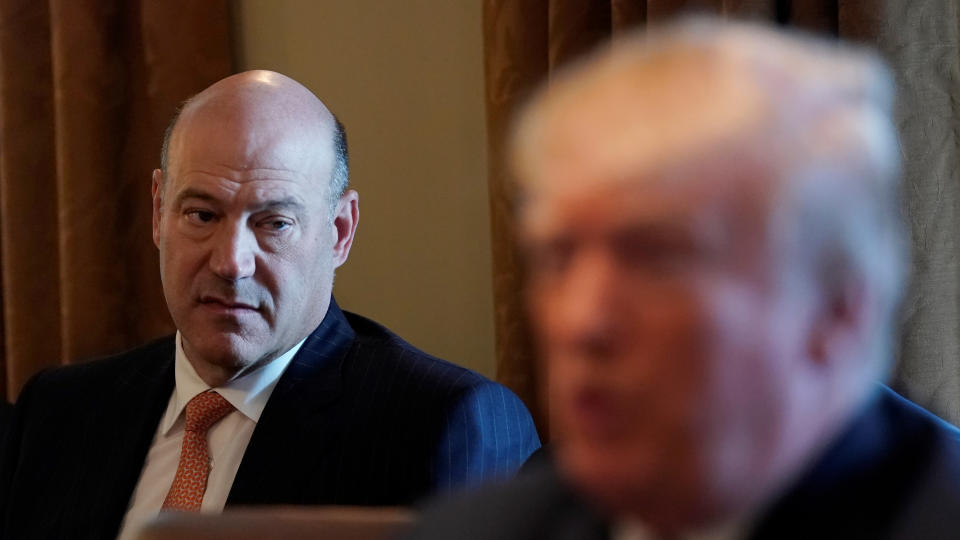Ex-Trump adviser Gary Cohn would back Biden’s proposed 28% corporate tax rate
President Donald Trump’s former chief economic adviser, Gary Cohn, once helped craft the Tax Cuts and Jobs Act of 2017 that lowered the corporate federal income tax rate (TCJA) from 35% to 21%. Yet he’s comfortable with the rate moving no higher than 28%, a level proposed by Democratic presidential candidate Joe Biden, Cohn told Yahoo Finance’s Adam Shapiro in an interview during Yahoo Finance’s All Markets Summit on Monday.
The 28% corporate tax rate proposed by Biden would still make the U.S. an attractive place for businesses, according to Cohn, a Democrat who served for a decade as COO for The Goldman Sachs Group, Inc. before his time in the White House.
“How do you compete against every other nation in the world? Because international corporations can decide where they’re domiciled … To me, 28% is probably a good number to land on, to end up being attractive to corporations to be in the United States,” Cohn said.

And it’s not just the tax rate, Cohn added, it's what is being taxed. Under the CARES Act, he said, in order to stimulate the economy, corporate deductions eliminated under Trump’s tax law, such as travel and entertainment, were brought back.
‘We eliminated a lot of loopholes’
The Trump administration’s tax overhaul has come under criticism given persistent loopholes that allow corporations to drive the effective rate well below the statutory level. In 2018, the work arounds helped a group of 378 consistently profitable Fortune 500 companies to pay an average federal rate of 11.3% on their 2018 income, according to a report from the Institute on Taxation and Economic Policy (ITEP), a non-partisan think tank.
But Cohn said the overhaul still got rid of many loopholes.
“Let's compare it to what it was prior,” Cohn said of Trump’s tax law. “There were many corporations paying no tax under the prior tax law, as well. We eliminated a lot of the loopholes. I'm not going to sit here and say we eliminate all the loopholes. We eliminated many, many of the loopholes.”
The ITEP’s most recent report on corporate tax loopholes may tell a different story. It analyzed the rates paid by profitable Fortune 500 companies during one year under the new rate and eight years under the prior rate. Both resulted in effective rates paid of just more than half the statutory rates.
From 2008 to 2015 when the tax rate was 35%, 258 consistently profitable Fortune 500 corporations paid an effective corporate tax rate of 21.2%, with many prominent companies like General Electric (GE), Priceline.com, and PG&E (PCG) paying no tax at all, according to the ITEP analysis.
In 2018, among 379 profitable corporations in the study the effective federal rate paid was 11.3%, with 91 corporations including Amazon (AMZN), Chevron (CVX), Halliburton (HAL) and IBM (IBM) paying zero federal income tax.
ITEP concluded that loopholes and special breaks rather than the rate itself were responsible for the shortfalls.
“We still have a huge offshoring issue,” Cohn said of loopholes still needing to be closed. “You can create these intellectual property boxes offshore and put your intellectual property in them and then license them back to your U.S. subsidiary. We were doing a lot of work on that. We went as far as we thought we could go and get a tax bill passed.”
Practices known as the “Double Irish” and “Dutch Sandwich” were popularized by Apple (AAPL) and adopted by companies with large intangible assets, predominantly intellectual property, to avoid paying income tax. Google (GOOG)(GOOGL), Microsoft (MSFT), and others have used the strategy to push profits to tax havens in Bermuda, for example, through wholly owned subsidiaries in Ireland and The Netherlands. In 2019, Google announced it would no longer implement the tax strategy and going forward would license its IP in the U.S. instead of in Bermuda.
Asked whether a 28% rate was counter to the federal government’s goal of clawing back tax dollars to federal coffers, Cohn said the figure represents one that is the upper limit of what corporations will view as competitive.
“There's a rate where it gets too high, where they don't want to be,” Cohn said. “That 21% to me was the lower end of where we needed to be.”
Read more:
Gary Cohn wants $1 trillion to save the U.S. economy
Alexis Keenan is a legal reporter for Yahoo Finance and former litigation attorney.
Follow Alexis Keenan on Twitter @alexiskweed.
Follow Yahoo Finance on Twitter, Facebook, Instagram, Flipboard, SmartNews, LinkedIn, YouTube, and reddit.

